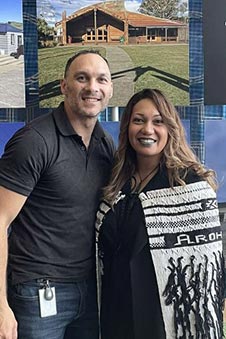
Elishia Mako.
Elishia Mako (Ngāi Tahu, Tūhoe, Tainui) is putting the CHI team through their paces in an effort to generate base-line data on cultural awareness, existing attitudes and practices in the group.
The summer studentship project, led by Dr Karaitiana Taiuru, (Ngāi Tahu, Ngāti Kahungunu, Ngāti Toa), invites all members of the CHI to participate in a survey, designed to gather detailed information about their interactions with patients and study participants. The aim is part of an overall intention by the CHI to increase their sensitivity to cultural and spiritual differences among research participants, so helping to ensure appropriate interaction and response to individuals. To this end, the survey data will help steer steps forward.
According to Elishia, who is a law student at Te Whare Wānanga o Waitaha|Canterbury University, CHI is more ahead of the game on this approach than many other research groups.
“By embracing kaupapa Māori in the context of medical research, the CHI is very progressive. The team is committed to increasing their knowledge and awareness, to ensure Māori, as well as, Pasifika and other minority groups, feel comfortable, respected and understood when interacting with the team,” Elishia said.
After an enriching earlier life, Elishia hit her 30s and new avenues opened up. Elishia's whānau ora journey via Tipu Ora added greater yearning to reconnect with her whakapapa, which ignited a desire to be of service to her people. She also decided to pursue a law degree.
“I am actually torn between law and health. It is evident that Māori are oppressed and discriminated against in both of these areas. It is vital that whānau are self-determining and that the cycle of intergenerational trauma is broken. I hope that all of Aotearoa|New Zealand wake up to living better, in partnership, participation and relationship with one another – a collective understanding of each other,” she said.
For Elishia, working on the CHI's summer studentship project has genuine purpose. “When accepting this project, I was convinced I would be taken seriously, the process was meaningful as opposed to your classic box ticking, tokenistic, lip service project that struggles to meet bare minimum, and begin a transformational experience and process for everyone involved.
“The CHI is fully committed to the kaupapa Māori approach. I hope it will encourage Māori people to take part in life-saving heart-health medical research, in a culturally safe environment, with the ultimate outcome of reducing premature deaths from heart disease in my people,” she said.
